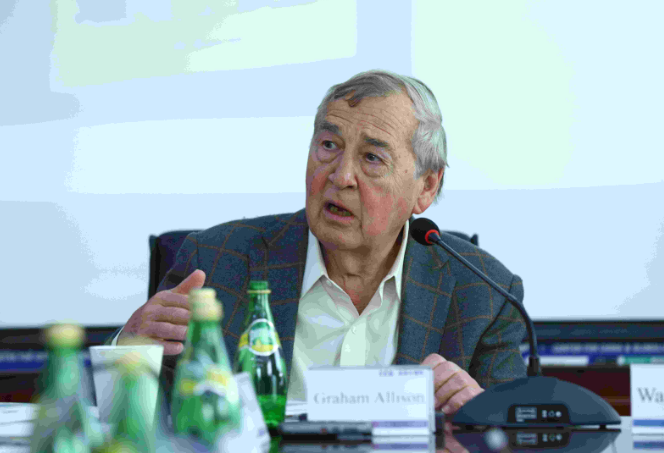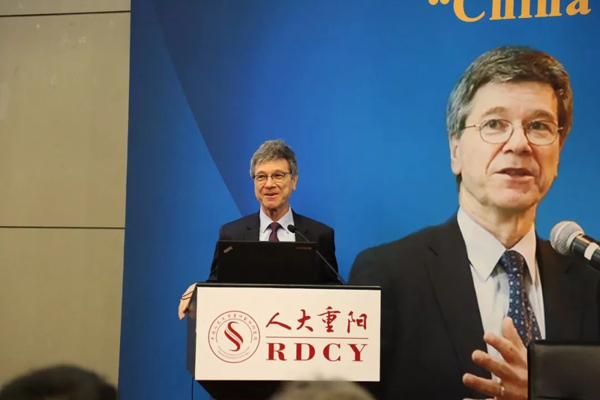Major Power Relations
Your Present Location: PROGRAMS> Major Power RelationsIs Thucydides wrong when it comes to China and U.S.?
Source: CGTN Published: 2019-3-25
Over the course of history, 12 out of 16 cases where rising powers confronted established powers ended up in war, from the Peloponnesian War to the most recent World War II. The world has remained peaceful for seven decades under a post-war international order, up until very recently, when the United States perceived the "threat" of a China that is rising meteorically.
Since the Obama era, Washington has started worrying about China with his "pivot to Asia" policy to largely contain the Asian powerhouse. Trump's inauguration has fed the fire. In 2018, Pentagon's national defense strategy listed China and Russia as top threats to the U.S., its allies and established partners. The year-long trade conflict waged by the Trump administration has put the world market on tenterhooks. Many predict that Beijing and Washington will fall to the fate of the Thucydides Trap.
"Thucydides Trap is the dangerous dynamic that occurs when a rising power threatens to displace a ruling power," said Graham Allison, the Harvard scholar who coined the phrase at a recent forum hosted by the Center for China and Globalization (CCG).
Why is the Thucydides Trap rhetoric pervasive?
China, which has been rising on more dimensions than any other country in history, is "inevitably and inescapably encroaching on positions and prerogatives that the U.S. has become accustomed to being at the top of every pecking order," said Allison, the founding dean of Harvard's John F. Kennedy School of Government, as he explained the reason behind the Thucydides dynamic, in which the rivalry creates a vulnerability to extraneous actions unrelated to the rivalry.
The dynamic has taken shape within a short span of time, influencing a handful of American elites to many outsiders of politics. Whenever there were complaints from Washington regarding China's trade practices, Wall Street would steer the former away from conflict. But things have changed. In fall 2018, a Pew survey showed that nearly half of Americans polled expressed unfavorable attitudes while those with positive opinions fell to 38 percent from 44 percent in the previous year.

Harvard professor Graham Allison speaks at a forum hosted by the CCG in Beijing, March 22, 2019. /CGTN Photo
However, it's mainly "a psychological phenomenon" instead of a "true geopolitical phenomenon," noted Jeffrey Sachs, the American hailed by the New York Times as probably the world's most important economist.
"In the American mentality, China went very quickly within a few years from being a developing country to a dangerous counterpart to a threat and even in many articles and newspapers, an enemy," Sachs said in a speech at the Chongyang Institute for Financial Studies of Renmin University of China on Saturday.
Former U.S. treasury secretary Lawrence Summers believed that the narrowing of the industrial gap has plunged Beijing and Washington into the trap. "The industrial revolution changed virtually everything from gender roles, to art forms, to the nature of science, to places in which people live, to the way in which they conceived progress, to the way in which people thought of one another," he said at the CCG forum in Beijing Friday.
The U.S. pioneered the third industrial revolution after the two world wars tanked the European economy. Over the decades, it's been at the very top of the pyramid economically as well as technologically. But as time goes on, material abundance decoupled from human labor may not be the panacea to all problems. China and the U.S. have become contenders in the new epoch of industrialization – dominated by chips and algorithms.

Former U.S. treasury secretary Lawrence Summers speaks at a forum hosted by the CCG in Beijing, China, March 22, 2019. /CGTN Photo
Summers wrote in the Financial Times that "no trade deal can dictate our relationship with China," saying the U.S. should focus on developing its own economy. "I think the economic history of the United States is a history of resilience. We believe we were a national malaise in 1979, but things seemed very different just a few years later," he told CGTN at the forum when asked how he would convince the Trump administration that the U.S. itself is responsible for much of its economic woes.
Can China, U.S. escape the Thucydides Trap?
Although bilateral relations have taken a dive, continued escalation of tensions need not be the norm. Both sides can reflect on their current positions and conditions while making changes that would address the concerns of the other.
Jeffrey Sachs, for instance, noted that as a leader in sustainable development among developing countries, China can leverage its role to engage in actions that reassure the international community. He suggested that China can solve some of the biggest challenges in the world through approaches such as its Belt and Road Initiative. In order to do so, cooperating on projects in partner countries in areas such as energy requires China to be a role model, by building renewable energy infrastructure using wind, solar and hydropower, not coal.
The economist who came up with the shock therapy for Bolivia, Poland and Russia, also emphasizes that fostering interregional connectivity must be done well, implementing "high-quality projects" that don't go "bankrupt or ending without providing services." If so, China can show that its technological progress is not only impressive, but its consideration of sustainability will inspire the world as well.

American economist Jeffrey Sachs delivers a speech at the Chongyang Institute for Financial Studies, Renmin University of China, in Beijing, China, March 24, 2019. /CGTN Photo
When a relationship sours, the parties involved may need a dose of self-awareness. Since the beginning of the trade conflict, the U.S. has blamed China for its domestic economic woes. But Lawrence Summers observed that had China agreed to "every trade demand that the United States had made," U.S. GDP would not have changed significantly. He went on to say that it is “not accurate to assert that China is the cause of de-industrialization in the American economy."
When critics of China say that the U.S. is suffering from unfair bilateral trade, they often do not take into account myriad factors such as the U.S.'s extra exports, and the benefits of lower-priced imports in stimulating the domestic consumer economy.
For China's part, Summers stated that in the U.S., there is a general erosion of trust in China, especially among groups that had previously supported the latter such as the U.S. business community. To address critics that think China needs to be more accommodating now that it is a mighty economic force, reforms that aim to further open up the country's economy to enterprises and investment while protecting them such as through the new Foreign Investment Law demonstrate a positive policy trend toward reaching global standards.
Escaping escalating conflict requires not simply awareness but the realization of the other party's goals and values. As China rises, it is normal for the U.S., the dominant power, to assume that the former wants to challenge its position.
Allison, however, stipulates that China's primary aim is "not about displacing the U.S., (but) simply about China taking miserably poor people and making them less poor." In other words, the Chinese Dream is to lift its citizens from poverty and have them achieve prosperity. In doing so, its growth may be staggering and perhaps surprising to neighboring states and extant world powers, but its motivation primarily comes from ensuring the welfare of its people.
The Thucydides Trap is an observation for the ages, but it is not a law of history. Allison identified that in 16 cases where a rising power challenged a dominant one, four did not end in war.
Just how can both China and the U.S. extricate themselves? Although they are steeped in their respective national interests, both countries may have to consider another source of wisdom. Entrepreneur and former Asia fellow at Harvard, Li Xiaotao, recalled that during his time at the university, he saw that scholars and other elites there tended to look at things from a global standpoint instead of perspectives based only on Beijing's or Washington's interests.























































































 京公网安备 11010802037854号
京公网安备 11010802037854号





